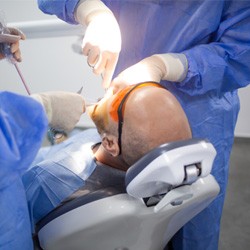Dental Implants — Norwalk, OH
Filling the Empty Spac

At some point, you may need to decide what you’re going to do about a missing tooth or teeth. Leaving the empty space alone is never a good option; it’ll make it much harder to speak and chew properly, and it could even lead to additional oral health problems. In contrast, one of the best choices you can make is to get dental implants in Norwalk. Prosthetic teeth supported by implant posts grant a lot of benefits that you wouldn’t get from other forms of tooth replacement. Contact Sommers Family Dentistry for a consultation today if you’re facing life with a gap in your smile.
Why Choose Sommers Family Dentistry for Dental Implants?
-
Partnered with Trusted Oral Surgeons for Optimal Results
- State-of-the-Art Dental Technology
- Flexible Financing Available
What Are Dental Implants?

A dental implant is a titanium post that’s surgically inserted into the jawbone to replace the entire structure of a missing tooth. Since it’s made of biocompatible titanium, the artificial tooth root will successfully integrate with the surrounding bone tissue via a natural process called osseointegration. Once fully healed, it’ll be used to support a crown, bridge, or denture above the gum line. You’ll have a newly rebuilt smile that looks and feels so natural!
The 4 Step Dental Implant Process

Dental implants are one of the most secure ways to replace missing teeth. And while the process takes several months, the results are well worth the wait! At Sommers Family Dentistry, we follow a precise four-step process to ensure your implants are successful and long-lasting. From your initial consultation to the final restoration, our team will guide you every step of the way. Read more below to see what to expect when getting dental implants with us.
Initial Dental Implant Consultation

Your treatment starts with a thorough consultation at our Norwalk office. During this visit, we’ll review your medical and dental history, take digital X-rays to assess your teeth and jaw, and then discuss your smile goals. From there, we can go over your treatment options and see if dental implants are the right treatment for you.
If you’re a good candidate, we’ll create a personalized treatment plan. In some cases, a bone graft or other preliminary procedure may be needed before implant placement. In either case, we’ll refer you to a top specialist in the area so you can be sure that your implant is placed correctly.
Dental Implant Surgery

The implant placement procedure is performed with precision by a skilled oral surgeon to ensure long-term success. On the day of surgery, they’ll:
- Numb the area and offer sedation if needed for maximum comfort.
- Make a small incision in your gums to expose your jawbone.
- Place a titanium implant post securely into the bone.
- Stitch the area closed to let the healing begin
While this process can sound uncomfortable, there’s no need to stress. Most patients experience minimal discomfort and can continue their normal routine quickly, often the next day! Our partner will also provide post-op care instructions to make your recovery as smooth as possible.
Dental Implant Osseointegration & Abutment Placement

Over the next three to six months, a critical process called osseointegration takes place. This is when the implant fixture fuses with your jawbone, creating a foundation for your new tooth. Once healing is complete, we:
- Place a small connector piece, called an abutment, on top of the implant.
- Allow the gums to heal around the abutment for a few more weeks.
- Take impressions to send to a local dental lab to craft your custom dental crown, bridge, or denture.
This step ensures your final restoration looks and functions just like natural teeth. In fact, dental implants restore up to 70 percent of your biting force, outperforming other prosthetics like traditional dentures.
Delivery of Dental Implant Restorations

The final step is attaching your custom-made restoration. Once your permanent crown, bridge, or denture is ready, we’ll call you for a follow-up appointment. During this visit, we’ll attach your restoration to the abutment, make final adjustments for a perfect fit, and provide aftercare instructions to help maintain your new smile.
Once your restoration has been placed, you can start enjoying all the benefits right away! Even better, with good oral hygiene and regular dental visits, your implants can last a lifetime. At Sommers Family Dentistry, we’re here to ensure your new smile stays healthy and beautiful for years to come.
Benefits of Dental Implants

A dental implant isn’t actually a direct replacement for a tooth; it serves as the “root” for a crown, bridge, or denture. The implant post is placed directly into the jaw and integrates with the bone naturally; because of this, not only will your prosthetic tooth or teeth be much more stable and secured in place, but it’ll also help stimulate the jawbone to stop it from deteriorating.
Implants have an extremely high rate of success compared to other restorations – usually estimated at 95% to 98% -- and can last for decades or even a lifetime with the proper care. They also let you eat and drink anything you want, and the prosthetic teeth they support look natural in the mouth.
Who Dental Implants Can Help

Almost anyone with tooth loss qualifies for dental implants. Whether you lack one pearly white or many, the prosthetics can restore your smile fully and effectively! Still, you’ll need to consult our dental team before confirming implant surgery. Doing so settles the candidacy question and lets us establish an informed treatment plan. As for what to expect from this discussion, Sommers Family Dentistry can help: listed below are qualities of good implant candidates and the implant types that might suit you. Read them over to prepare for your future consult. Otherwise, get details ahead of time by calling our office!
Who is a Good Candidate for Dental Implants?

If you’re a healthy adult who’s missing teeth, you likely qualify for implants. Often enough, matching that description is all it takes to move forward with treatment. To be more specific, though, strong implant candidates have the following three qualities:
- Good Overall Health: Dental implants require actual oral surgery. As such, your body needs to be healthy enough to undergo the procedure.
- Great Oral Health: For implants to succeed long-term, you must have excellent oral health. Otherwise, issues like cavities and gum disease could cause the prosthetics to fail.
- Sufficient Jawbone Density: Implants will only work if your jawbone is strong enough to support them.
Even if you don’t qualify now, it’s possible to get dental implants later. A dentist could first perform preliminary procedures like tooth extraction(s), gum disease therapy, or bone grafting. (Our office can even assist with scheduling these procedures.) From there, you could proceed with treatment and get your smile on track.
Missing One Tooth

For a single missing tooth, our team would place one implant post along with a crown. This solution is sturdier, longer-lasting, and more seamless than a dental bridge. Most people won’t be able to tell that you’ve had a tooth replaced!
Among the single-tooth implant’s many advantages, one is that it doesn’t remove healthy enamel from adjacent teeth. As a result, it won’t weaken your other pearly whites or make them sensitive.
Missing Multiple Teeth

If you’re missing several teeth in a row, you could get what’s called an implant bridge. The latter is a restoration composed of two dental implants fused to a few pontics.
Unlike regular bridges, an implant bridge isn’t supported by other teeth. As a result, it lets you save your enamel.
Missing All Teeth

Patients who lack all the teeth along an arch may want to try an implant denture. Unlike other kinds, this prosthetic is fixed with four to six well-placed dental implants. It’s thus able to bring back an entire row of teeth at once.
This option is especially ideal if you want something permanent and stable. Since it relies on dental implants, an implant denture won’t slip around or lose its fit. You’d then get to enjoy a secure smile with only a minimal number of titanium posts.
Maintaining & Caring for Your Dental Implants

Once placed, dental implants can keep your smile full and healthy for a lifetime. Such longevity sets implant treatment apart from other restorations! That said, implants need proper daily care to achieve a long lifespan. They’ll fail early from damage or infection otherwise. From there, you’d need to get replacement implants. Still, Sommers Family Dental can help: here are some tips on dental implant care in Norwalk. By learning and following them, you’ll enjoy your new smile for years to come!
Make Oral Hygiene a Priority

Implants, of course, can’t get cavities. They’re made of titanium and porcelain, not tooth enamel. However, you’ll still need to practice good oral hygiene for their sake.
You see, implants sit next to your natural teeth and gums. Problems with the latter can affect the former. For example, gum disease can cause a nearby implant to loosen and fail. The condition could erode the tissue supporting your prosthetic tooth.
Therefore, remember to brush to make oral care a priority. In particular, always brush twice daily, floss once daily, and rinse with mouthwash often.
Eat a Healthy Diet

Because implants strengthen your bite, they’ll let you eat a wide variety of foods. Even so, that fact doesn’t mean you should follow a reckless diet. If possible, try to stick to mouth-healthy meals in the future.
In truth, some foods put implants at risk. Hard products – pretzels, nuts, jawbreakers – can chip them. Meanwhile, anything sticky or sugary can wedge itself between implants and decay nearby teeth.
For these reasons, eat foods with mouth-healthy nutrients. Good examples include apples, lean proteins, and leafy greens. Their items have calcium and vitamin C – substances that prevent gum disease and strengthen your jaw.
Break Bad Habits

As with certain foods, bad oral habits can chip or break implants. They thus put your smile at risk of implant failure. To keep that problem at bay, then, quit your unsafe oral habits quickly.
Take smoking, for instance. Tobacco products slow your recovery from implant work and promote gum disease. As such, continued use of them will cause implants to fail.
Similarly, harsh biting can also hurt implants. The habit often breaks restorations, whether you’re grinding your teeth or chewing some ice. So, avoid it as best you can.
Protect Your Dental Implants

Implants are strong, not indestructible. They could easily get damaged by excessive force. That being the case, you’ll need to protect them with the right tools.
Your best option is to wear oral appliances. For instance, a mouthguard for sports would keep you from getting dental chips or cracks. A nightguard for sleep, in contrast, protects implants from tooth grinding.
Schedule Regular Dental Checkups

If you want your veneers to work for a while, attend dental checkups every six months. These visits will address any issues your home care might miss.
Dental checkups are one of the best ways to maintain veneers. After all, the appointments let a dentist assess your oral health and spot problems early. The result is that your small dental issues never worsen enough to threaten veneers. Each visit diagnoses and treats problems before an emergency can occur.
Understanding the Cost of Dental Implants

There are many different factors that go into determining the final cost of your implants – how many posts are needed, what procedures need to be performed, the type of restoration you’ll get, and so on. We’ll help you form an estimate based on these factors and will work with you to help make sure your new teeth are affordable. Don’t forget, dental implants are a long-term investment in a top-quality smile!
Dental Implant FAQs

If you’re just learning about dental implants for the very first time, there’s no need to worry. Our team is happy to answer any and all questions you may have about treatment. Over the years, our dentists have gotten many questions regarding this revolutionary method of tooth replacement. Below, you can find a handful of these questions and detailed answers from Dr. Adam and Norman Sommers. If you have other questions that aren’t listed, please call our office to set up an implant consultation.
Why do people like dental implants so much?
Over the past couple of decades, dental implants have become the gold standard for tooth replacement thanks to their longevity, function, esthetics, and reliability. Many patients appreciate the fact that they can eat foods that are tough or crunchy in nature, which other tooth replacement options do not allow. Additionally, their reliability means they can treat them much like their original teeth. They can even brush and floss them as they did previously for their natural teeth, meaning they won’t have to make dramatic changes to their routine once they have fully healed.
Are there restrictions that will prevent me from receiving dental implants?
There are some necessary conditions patients must follow if they want their dental implant treatment to be a success. For example, they will need to have sufficient bone tissue for the implant posts to integrate inside of. The health of your gums also plays a major role as gum disease can negatively affect the healing process. If you use tobacco in any form, you’ll need to discontinue it as it can also affect the healing of the implant inside the soft tissue. As long as you have good oral and overall health as well as enough bone tissue, you should be eligible for dental implants.
Can dental implants fail?
While the success rate for dental implants is incredibly high, there are instances where an implant can fail. If the patient uses tobacco during the healing phase of treatment (i.e. immediately after surgery) or the implants were placed without confirming the integrity of the bone tissue, the body can reject it and cause it to fall out or require extraction. However, because our dentists partner with specialists in the area for your care, it’s extremely unlikely that your implants will fail when you follow all of our aftercare instructions.






